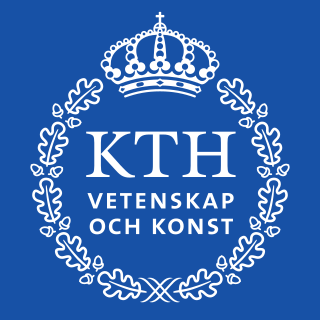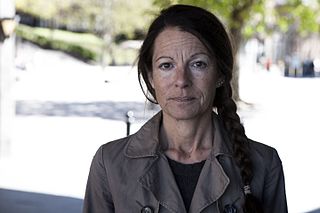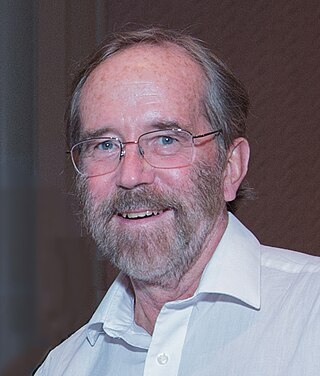Related Research Articles

The KTH Royal Institute of Technology, abbreviated KTH, is a public research university in Stockholm, Sweden. KTH conducts research and education in engineering and technology and is Sweden's largest technical university. Currently, KTH consists of five schools with four campuses in and around Stockholm.

Gösta Ingvar Carlsson is a Swedish politician who twice served as Prime Minister of Sweden, first from 1986 to 1991 and again from 1994 to 1996. He was leader of the Swedish Social Democratic Party from 1986 to 1996. He is best known for leading Sweden into the European Union.

The Royal Swedish Academy of Sciences is one of the royal academies of Sweden. Founded on 2 June 1739, it is an independent, non-governmental scientific organization that takes special responsibility for promoting natural sciences and mathematics and strengthening their influence in society, whilst endeavouring to promote the exchange of ideas between various disciplines.
The Crafoord Prize is an annual science prize established in 1980 by Holger Crafoord, a Swedish industrialist, and his wife Anna-Greta Crafoord. The Prize is awarded jointly by the Royal Swedish Academy of Sciences and the Crafoord Foundation in Lund, with the former selecting the laureates. The prize is awarded in four categories: mathematics and astronomy, geosciences, biosciences and polyarthritis, the disease from which Holger severely suffered in his later years.

Tage Fritjof Erlander was a Swedish politician and statesman who served as the prime minister of Sweden and leader of the Social Democratic Party from 1946 to 1969. Previously, he served as minister of education from 1945 to 1946, and was a member of the Riksdag from 1932 to 1973. During his premiership, Sweden developed into one of the world's most advanced welfare states, with the "Swedish Model" at the peak of its acclaim and notoriety. His uninterrupted tenure of 23 years as head of the government is the longest ever in Sweden and in any modern Western democracy.

Torsten Nils Wiesel is a Swedish neurophysiologist. With David H. Hubel, he received the 1981 Nobel Prize in Physiology or Medicine, for their discoveries concerning information processing in the visual system; the prize was shared with Roger W. Sperry for his independent research on the cerebral hemispheres.

Aina Erlander was a Swedish lecturer and the wife of Swedish Prime Minister Tage Erlander from 1930 until his death in June 1985.

Fredrik Lindström is a Swedish comedian, film director and presenter.

Susan Solomon is an American atmospheric chemist, working for most of her career at the National Oceanic and Atmospheric Administration (NOAA). In 2011, Solomon joined the faculty at the Massachusetts Institute of Technology, where she serves as the Ellen Swallow Richards Professor of Atmospheric Chemistry & Climate Science. Solomon, with her colleagues, was the first to propose the chlorofluorocarbon free radical reaction mechanism that is the cause of the Antarctic ozone hole. Her most recent book, Solvable: how we healed the earth, and how we can do it again (2024) focuses on solutions to current problems, as do books by data scientist Hannah Ritchie, marine biologist, Ayana Elizabeth Johnson and climate scientist Katharine Hayhoe.
Achim Richter is a German nuclear physicist. He became a professor at the Institute of Nuclear Physics at the Darmstadt University of Technology in 1974 and retired in September 2008. From 1 November 2008 to 31 October 2012 he was director of the European Centre for Theoretical Studies in Nuclear Physics and Related Areas (ECT*) in Trento, Italy. Since 1 November 2012, he has been professor again at the Institute for Nuclear Physics of TU Darmstadt.

The Nobel Memorial Prize in Economic Sciences, officially the Sveriges Riksbank Prize in Economic Sciences in Memory of Alfred Nobel, is an economics award funded by Sveriges Riksbank and administered by the Nobel Foundation.

Sven Bertil Erlander was a Swedish mathematician and academic.

Anne Geneviève L'Huillier is a French physicist. She is a professor of atomic physics at Lund University in Sweden.

Pernilla Wittung-Stafshede is a Swedish biophysical chemist, born in 1968, who is a professor of chemical biology at Chalmers University of Technology in Gothenburg. In 2019 she was named by International Union of Pure and Applied Chemistry as a Distinguished Woman in Chemistry.
Torsten Valdemar Gustafson was a Swedish physicist and professor in theoretical physics at Lund University.
Egor Babaev is a Russian-born Swedish physicist. In 2001, he received his PhD in theoretical physics from Uppsala University (Sweden). In 2006 he joined the faculty of the KTH Royal Institute of Technology in Stockholm. In 2007-2013 he shared this position with a faculty appointment at Physics Department of the University of Massachusetts, Amherst (USA). He is currently full professor at the Physics Department KTH Royal Institute of Technology.

Joseph "Joe" E. Greene, known in his professional writing as J. E. Greene was an American materials scientist, specializing in thin films, crystal growth, surface science, and advanced surface engineering. His research and scientific contributions in these areas have been described as "pioneering" and "seminal" and that his work "revolutionized the hard-coating industry".
Beth L. Parker is a hydrogeologist and professor at the University of Guelph who has made exceptional contributions to the science and practice of Contaminant Hydrogeology and the protection of groundwater from contamination, that have been adopted internationally to protect water supplies in Guelph and many other communities.
Xiaodong Zou is a Chinese-Swedish chemist who is a professor at Stockholm University. Her research considers the development of electron diffraction for the three dimensional characterisation of materials. She is a member of the Nobel Committee for Chemistry. She was elected to the Royal Swedish Academy of Sciences and the Royal Swedish Academy of Engineering Sciences.
Lilian Matthiesen is a mathematician whose research involves analytic number theory including the application of Fourier analysis to Diophantine geometry. Educated in England, she has worked in France, Germany, and Sweden, and is University Professor in the Mathematics Institute of the University of Göttingen in Germany.
References
- ↑ Yngre forskare tilldelas nationellt pris och belöning [Young researchers are awarded national prizes and awards] (in Swedish), Royal Swedish Academy of Sciences, 21 March 2024, retrieved 2024-08-14